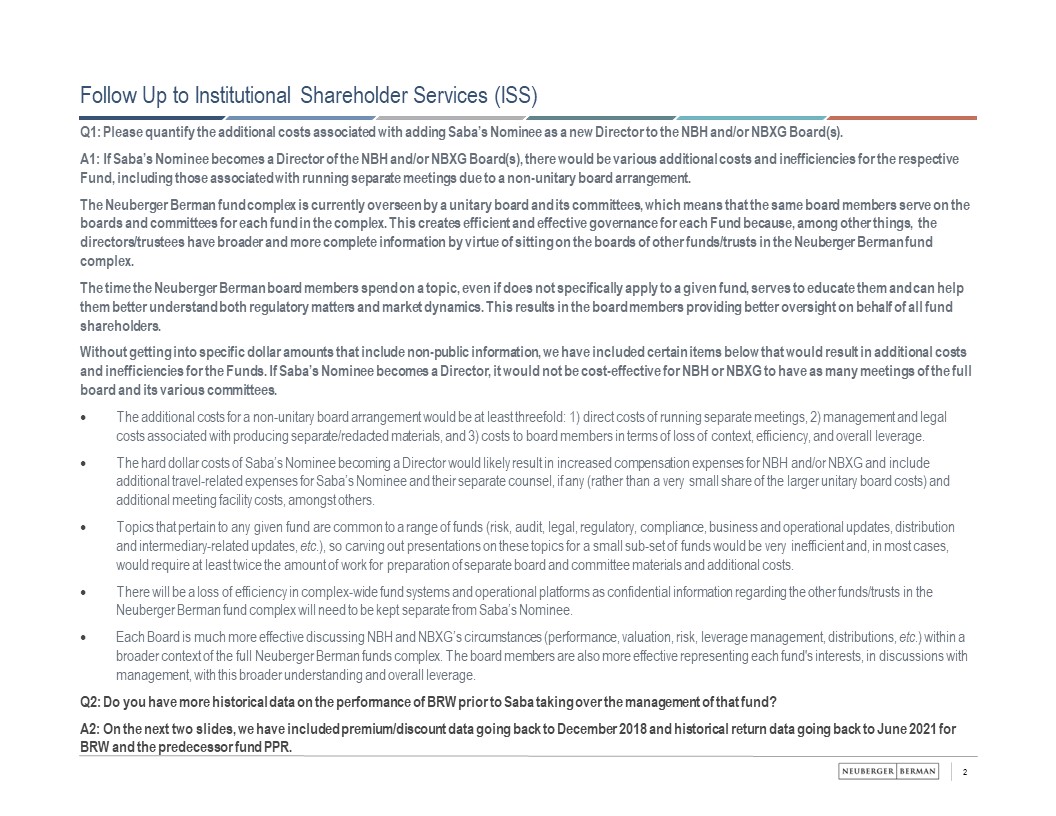Follow Up to Institutional Shareholder Services (ISS) Q1: Please quantify the additional costs associated with adding Saba’s Nominee as a new Director to the NBH and/or NBXG Board(s). A1: If Saba’s Nominee becomes a Director of the NBH and/or NBXG Board(s), there would be various additional costs and inefficiencies for the respective Fund, including those associated with running separate meetings due to a non-unitary board arrangement. The Neuberger Berman fund complex is currently overseen by a unitary board and its committees, which means that the same board members serve on the boards and committees for each fund in the complex. This creates efficient and effective governance for each Fund because, among other things, the directors/trustees have broader and more complete information by virtue of sitting on the boards of other funds/trusts in the Neuberger Berman fund complex. The time the Neuberger Berman board members spend on a topic, even if does not specifically apply to a given fund, serves to educate them and can help them better understand both regulatory matters and market dynamics. This results in the board members providing better oversight on behalf of all fund shareholders. Without getting into specific dollar amounts that include non-public information, we have included certain items below that would result in additional costs and inefficiencies for the Funds. If Saba’s Nominee becomes a Director, it would not be cost-effective for NBH or NBXG to have as many meetings of the full board and its various committees. The additional costs for a non-unitary board arrangement would be at least threefold: 1) direct costs of running separate meetings, 2) management and legal costs associated with producing separate/redacted materials, and 3) costs to board members in terms of loss of context, efficiency, and overall leverage. The hard dollar costs of Saba’s Nominee becoming a Director would likely result in increased compensation expenses for NBH and/or NBXG and include additional travel-related expenses for Saba’s Nominee and their separate counsel, if any (rather than a very small share of the larger unitary board costs) and additional meeting facility costs, amongst others. Topics that pertain to any given fund are common to a range of funds (risk, audit, legal, regulatory, compliance, business and operational updates, distribution and intermediary-related updates, etc.), so carving out presentations on these topics for a small sub-set of funds would be very inefficient and, in most cases, would require at least twice the amount of work for preparation of separate board and committee materials and additional costs. There will be a loss of efficiency in complex-wide fund systems and operational platforms as confidential information regarding the other funds/trusts in the Neuberger Berman fund complex will need to be kept separate from Saba’s Nominee. Each Board is much more effective discussing NBH and NBXG’s circumstances (performance, valuation, risk, leverage management, distributions, etc.) within a broader context of the full Neuberger Berman funds complex. The board members are also more effective representing each fund's interests, in discussions with management, with this broader understanding and overall leverage. Q2: Do you have more historical data on the performance of BRW prior to Saba taking over the management of that fund? A2: On the next two slides, we have included premium/discount data going back to December 2018 and historical return data going back to June 2021 for BRW and the predecessor fund PPR.



